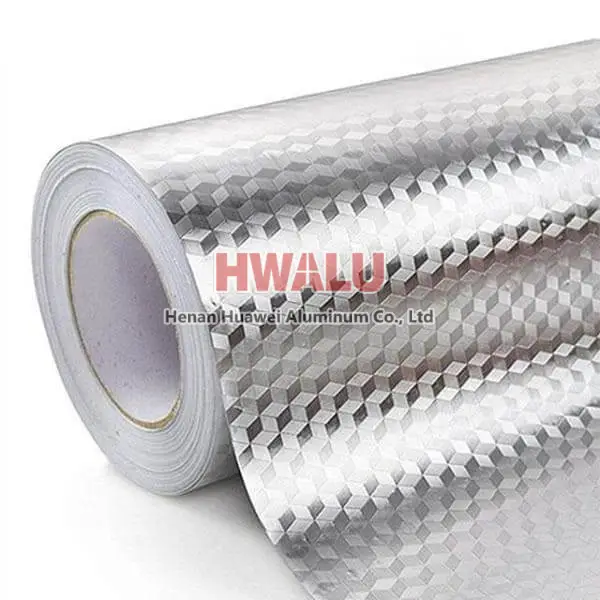What is Extra-heavy duty aluminum foil Extra-heavy duty aluminum foil is a type of aluminum foil that is thicker and more durable than standard or heavy-duty aluminum foil. It is designed to withstand higher temperatures and provide extra strength, making it suitable for more demanding applications in the kitchen and beyond. Extra-heavy duty aluminum foil common alloys The common alloy used for extra-heavy ...
Single zero aluminum foil refers to aluminum foil with a thickness between 0.01mm ( 10 micron ) and 0.1mm ( 100 micron ). 0.01mm ( 10 micron ), 0.011mm ( 11 micron ), 0.012mm ( 12 micron ), 0.13mm ( 13 micron ), 0.14mm ( 14 micron ), 0.15mm ( 15 micron ), 0.16mm ( 16 micron ), 0.17mm ( 17 micron ), 0.18mm ( 18 micron ), 0.19mm ( 19 micron ) 0.02mm ( 20 micron ), 0.021mm ( 21 micron ), 0.022mm ( 22 micron ...
What is 5052 alloy aluminum foil? 5052 aluminum foil is a common aluminum alloy material, which is composed of aluminum, magnesium and other elements, and has the characteristics of medium strength, good corrosion resistance and weldability. It is a common aluminum alloy material for industrial use, usually used in the production of fuel tanks, fuel pipelines, aircraft parts, auto parts, building panels, etc. 5 ...
What is Aluminum Foil Tape? Aluminum foil tape is a tape based on aluminum foil, which is divided into the single-sided tape and double-sided tape; it can also be divided into conductive tape and non-conductive tape; conductive tape can also be divided into the unidirectional conductive tape and anisotropic conductive tape; It is divided into ordinary aluminum foil tape and high-temperature resistant aluminum fo ...
what is Cold forming alu alu foil? Cold forming blister foil can absolutely resist vapor, oxygen and UV rays with good performance of aroma barrier. Each blister is a single protection unit, no effect to barrier after opening first cavity. Cold forming foil is suitable to pack drugs that easy to be affected in wet regions and tropics. It can be shaped in various appearance by changing stamping mold. Simultane ...
1. Wide moisture-proof waterproof: Aluminum foil tape has the performance of moisture-proof, waterproof, oxidation, etc., which can effectively protect the adhesive items and prevent them from being eroded by moisture and water vapor. 2. Innidity insulation: Aluminum foil tape has good thermal insulation performance, can effectively prevent heat transmission and is suitable for thermal insulation of pipelines, ...
Single-sided carbon-coated aluminum foil is a breakthrough technological innovation that uses functional coatings to treat the surface of battery conductive substrates. Carbon-coated aluminum foil/copper foil is to uniformly and finely coat dispersed nano-conductive graphite and carbon-coated particles on aluminum foil/copper foil. It can provide excellent electrostatic conductivity, collect the micro-current ...
Lunch boxes are essential packaging boxes in the food packaging industry. Common lunch box packaging materials on the market include plastic lunch boxes, aluminum foil lunch boxes, etc. Among them, aluminum foil lunch boxes are more commonly used. For lunch box packaging, aluminum foil is widely used due to its excellent barrier properties, flexibility and lightness. What aluminum foil alloy is most suitable for ...
The post-processing of aluminum foil is an important part of an enterprise, which is related to the yield of an aluminum enterprise and the profit point of the enterprise. The higher the yield, the higher the profit point of the enterprise. Of course, the yield rate must be controlled in every link, standardized operation, and sophisticated equipment and responsible leaders and employees are required. I don't und ...
Only China, the United States, Japan and Germany can produce double zero foils with a thickness of 0.0046mm in the world. From a technical point of view, it is not difficult to produce such thin foils, but it is not easy to efficiently produce high-quality double-zero foils on a large scale. At present, many enterprises in my country can realize the commercial production of double zero foil, mainly including: ...
A watch, two, feel, three, folding, four, twist, 5, knife scraping, 6, fire method, to help you identify the plastic composite packaging is made of aluminum foil or aluminum film material. Two, watch: the brightness of the packaging aluminum layer is not as bright as the aluminum plated film, that is, the packaging made of aluminum foil is not as bright as the packaging made of the aluminum plated film. Alumin ...







